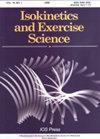表面肌电图无法预测肌肉的区域性肥大
IF 0.7
4区 医学
Q4 ENGINEERING, BIOMEDICAL
引用次数: 0
摘要
背景:在过去几十年中,新出现的证据表明,肌肉的生长并不是沿着肌肉头均匀分布的。这种现象被称为区域性肌肉肥大,并引发了一些有关其对健康和运动表现的影响的问题。目的:本研究旨在确定区域性肌肉肥大是否可通过表面肌电图(sEMG)进行预测。方法:36 名参与者以随机顺序进行了两种手臂练习(垫高卷曲和倾斜卷曲),在二头肌卷曲练习的 70% 1 RM 时达到肌肉衰竭。由于每位参与者的重复次数不同,因此对最后 3 次重复的峰值 sEMG 和 sEMG 积分进行了分析,并与之前进行的最大自主等长收缩(MVIC)进行了比较。结果:独立样本 t 检验显示,在不同练习中,任何特定区域的 sEMG 峰值和积分均无明显差异。结论:sEMG 不能用于预测区域肥大。本文章由计算机程序翻译,如有差异,请以英文原文为准。
Regional hypertrophy of muscle cannot be predicted by surface electromyography
BACKGROUND: In the last decades, emerging evidence has shown that muscle growth is not homogeneous along a muscle head. This phenomenon is known as regional muscle hypertrophy and has led to several questions regarding the implications it may have for health and sports performance. OBJECTIVE: The aim of this study was to determine whether regional hypertrophy can be predicted by surface electromyography (sEMG). METHODS: 36 participants performed two arm exercises (preacher curls and inclined curls) in a random order to muscle failure at 70% of the 1 RM of the bicep curl exercise. As every participant performed a different number of repetitions, Peak sEMG and the integral of the sEMG of the last 3 repetitions was analyzed an compared to previously performed maximal voluntary isometric contractions (MVIC). RESULTS: The independent sample t-tests showed no significant differences neither in the peak nor in the integral of the sEMG between exercises for any given region. CONCLUSIONS: sEMG cannot be used to predict regional hypertrophy.
求助全文
通过发布文献求助,成功后即可免费获取论文全文。
去求助
来源期刊

Isokinetics and Exercise Science
医学-工程:生物医学
CiteScore
1.20
自引率
14.30%
发文量
37
审稿时长
>12 weeks
期刊介绍:
Isokinetics and Exercise Science (IES) is an international journal devoted to the study of theoretical and applied aspects of human muscle performance. Since isokinetic dynamometry constitutes the major tool in this area, the journal takes a particular interest in exploring the considerable potential of this technology.
IES publishes studies associated with the methodology of muscle performance especially with respect to the issues of reproducibility and validity of testing, description of normal and pathological mechanical parameters which are derivable from muscle testing, applications in basic research topics such as motor learning paradigms and electromyography. The journal also publishes studies on applications in clinical settings and technical aspects of the various measurement systems employed in human muscle performance research.
The journal welcomes submissions in the form of research papers, reviews, case studies and technical reports from professionals in the fields of sports medicine, orthopaedic and neurological rehabilitation and exercise physiology.
 求助内容:
求助内容: 应助结果提醒方式:
应助结果提醒方式:


